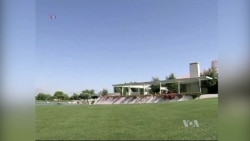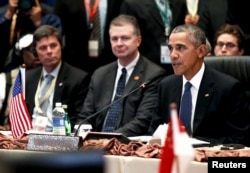ການຄ້າ ແລະຄວາມປອດໄພ ໃນເຂດປາຊີຟິກຈະເປັນຫົວຂໍ້ຂອງ
ການປະຊຸມ ເວລາປະທານາທິບໍດີ ສະຫະລັດ ທ່ານບາຣັກ ໂອບາ
ມາ ພົບປະໃນອາທິດໜ້າ ກັບບັນດາຜູ້ນຳຂອງ 10 ປະເທດສະມາ
ຊິກ ສະມາຄົມບັນດາປະຊາຊາດໃນເຂດເອເຊຍຕາວັນອອກສຽງ
ໃຕ້ ຫຼືອາຊ່ຽນ. ເຈົ້າໜ້າທີ່ສະຫະລັດກ່າວວ່າ ການພົບປະດັ່ງກ່າວ
ແມ່ນພາກສ່ວນນຶ່ງ ໃນການສ້າງຄວາມກ້ຳເກິ່ງຄືນໃໝ່ຂອງອາເມ
ຣິກັນໄປສູ່ເຂດເອເຊຍປາຊີຟິກ.
ພວກຜູ້ນຳຈະພົບປະກັນໃນວັນຈັນ ແລະວັນອັງຄານຈະມານີ້ ຢູ່ທີ່ບ້ານພັກຕາກອາກາດ
Sunnylands ໃນພາກໃຕ້ຂອງລັດຄາລີຟໍເນຍບ່ອນທີ່ປະທານາທິບໍດີໂອບາມາເຄີຍໄດ້
ພົບປະກັບປະທານປະເທດຈີນ ທ່ານສີ ຈິ້ນຜິງ ເມື່ອປີ 2013.
ຈີນ ຊຶ່ງບໍ່ແມ່ນປະເທດສະມາຊິກ ຂອງສະມາຄົມອາຊ່ຽນ ເປັນຄູ່ການຄ້າ ອັນດັບນຶ່ງຂອງ
ສະຫະລັດ. ບັນດາປະເທດສະມາຊິກອາຊ່ຽນຮວມກັນແລ້ວແມ່ນຄູ່ການຄ້າອັນດັບສີ່ຂອງ
ສະຫະລັດ.
ທ່າກຳປັ່ນທີ່ຢູ່ໃກ້ຄຽງກັນຂອງນະຄອນ Los Angeles ແລະ Long Beach ໃນລັດຄາລີ
ຟໍເນຍ ເຮັດໃຫ້ການຄ້າກັບເຂດເອເຊຍຕາເວັນອອກສຽງໃຕ້ ພວມຈະເລີນງອກງາມ ຊຶ່ງມີ
ມູນຄ່າທັງໝົດຫຼາຍກວ່າ 53 ພັນລ້ານໂດລາ ໃນປີ 2014 ແລະເຮັດໃຫ້ບັນດາປະເທດສະ
ມາຊິກອາຊ່ຽນ ກາຍເປັນຄູ່ການຄ້າທີ່ໃຫຍ່ອັນດັບສອງ ກັບນະຄອນ Los Angeles.
ທ່ານ Stephen Cheung ປະທານອົງການສູນການຄ້າໂລກ ທີ່ນະຄອນ Los Angeles
ຊຶ່ງເຮັດວຽກເພື່ອດຶງດູດເອົາການຄ້າ ແລະການລົງທຶນຂອງນາໆຊາດໄປຍັງຂົງເຂດ ກ່າວ
ວ່າ ພວກເຮົາມີຄຸ້ມຄົນໄທ ຫລື Thai Town ຢູ່ນີ້. ເຂດພາກໃຕ້ ຂອງລັດຄາລີຟໍເນຍ ເປັນບ່ອນຢູ່ອາໄສ ຂອງພວກຄົນເຂົ້າເມືອງ ຈາກທຸກໆເຂດ ຂອງເອເຊຍຕາເວັນອອກສຽງໃຕ້
ແລະມີປະຊາຄົມຫວຽດນາມ ຢູ່ນອກປະເທດໃຫຍ່ທີ່ສຸດ ແລະປະຊາຄົມຟີລິບປິນ ທີ່ໃຫຍ່
ທີ່ສຸດ ນອກຟີລິບປິນ ຢູ່ທີ່ນີ້. ທ່ານເວົ້າວ່າ ສິ່ງເຫລົ່ານີ້ແມ່ນຊັບສົມບັດທີ່ພວກເຮົາມີຢູູ່ເພື່ອ
ການຕໍ່ລອງ.
Trade and Pacific security will be on the agenda when U.S. President Barack Obama meets next week in California with leaders of the 10 member states of ASEAN, the Association of Southeast Asian Nations. U.S. officials say the meeting is part of an American rebalancing to the Asia-Pacific region.
The leaders meet Monday and Tuesday (Feb. 15-16) at the Sunnylands estate in Southern California, where Obama met with Chinese leader Xi Jinping in 2013.
China, which is not an ASEAN member, is the number one U.S. trading partner. The ASEAN nations together rank number four.
At the side-by-side ports of Los Angeles and Long Beach in California, trade with Southeast Asia is booming, totaling over $53 billion in 2014 and making the ASEAN nations the second-largest trading partner for Los Angeles.
"We have a Thai Town here," said Stephen Cheung, president of World Trade Center Los Angeles, which works to attract international trade and foreign investment to the region.
Southern California is home to immigrant populations from every part of Southeast Asia, and has the largest Vietnamese community outside of Vietnam and largest Philippine community outside the Philippines.
"These are all assets that we leverage," Cheung said.
Many American companies do business with Vietnam, from established brands like Starbucks and Pizza Hut to Silicon Valley tech startups. They are attracted by high growth in the region. Vietnam's economy is expanding at more than 6 percent a year. The Philippines sees similar growth rates and seeks investment in agricultural products such as cacao and coffee, and in manufacturing, medical tourism, and other sectors.
"You can service the various countries in Southeast Asia from the Philippines," said Gerry Palon of the Federation of Philippine American Chambers of Commerce. "We [the Philippines] are the gateway also to the Pacific, reaching out to Hawaii and on the mainland USA via the Pacific Ocean," he said.
U.S. vs. China
The United States and China are both working to boost trade ties with Southeast Asia, whose 625 million people share an economy of more than $2 trillion. A free trade agreement among the 10 ASEAN nations, known as the ASEAN Economic Community, went into effect late last year.
The U.S. is the driving force behind the 12-nation Trans-Pacific Partnership, which was signed this month in New Zealand. Four members of ASEAN — Brunei, Malaysia, Singapore and Vietnam — have joined the TPP.
All 10 ASEAN member states are also set to join a proposed Pacific trade group spearheaded by China, the Regional Comprehensive Economic Partnership.
The meeting in California is expected to draw protests. International human rights groups have criticized Cambodia in particular and its longtime prime minister, Hun Sen, for what the critics call repression and human rights abuses. Human Rights Watch says most other ASEAN members also have "poor human rights records."
Opponents of the U.S.-led Trans-Pacific Partnership have also promised to hold protests over the trade agreement.
White House aides have said Obama will address security issues when he meets with ASEAN leaders, including North Korea's nuclear test last month and missile launch Sunday.
Obama is also expected to tell the visiting leaders that rival claims by China and other Asian nations in the South China Sea should be resolved through negotiation and not, as one U.S. official said, "through one bigger nation bullying a smaller one." China has engaged in building artificial islands in the busy shipping region, which U.S. officials say could have military uses.







